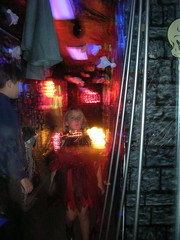 Haunted houses are not, alas, very cheap to put on in practical terms. There is the cost of the location; there is the necessity of obtaining actors; and, in most cases, there are props to be acquired or built. And, of course, there is a need to get guests - usually paying guests - to the haunted house, which means advertising costs.
Haunted houses are not, alas, very cheap to put on in practical terms. There is the cost of the location; there is the necessity of obtaining actors; and, in most cases, there are props to be acquired or built. And, of course, there is a need to get guests - usually paying guests - to the haunted house, which means advertising costs.Rare is the setup which has plenty of money and manpower - usually there is a tradeoff. A well-funded enterprise might have access only to those indifferent, unwilling, or just plain unknowledgeable, or a group of theater students might have the paltry profit from the last student production. A volunteer group might have to put up with bored teens just helping to get required "service" credit.
In general terms then, these will be the probable costs:
- Location. Unless one of your group is someone with a handy building just sitting around, it is likely that your group will have to rent a suitable building for your haunted house. Warehouses are very popular for these purposes, but be aware that such a building requires excessive construction of interior "walls". An actual building can be used, but be aware that there is a large probability that the location will be damaged over the course of a run, sometimes even deliberately. (More on that later.)
- Actors. While you might be in a group of friends who think that putting on a haunted house is the coolest thing in the world, chances are that you will need to solicit other people. Obviously, volunteers are cheap, but they vary in quality from sublime to sub-par. Some may even be entirely unreliable. Your best bet is to look for theater students, but be aware that they are saavy and will only work in quality conditions. (If you are unable to provide financial recompense, try to arrange a crediting scheme with the school or university. That way, the students get recompensed in the form of grades and extra credit.) In other words, if you are treating your actors badly, don't be surprised when they stop showing up entirely.
All paid positions must follow your local business laws. In fact, with certain for-profit haunted houses, you may not be able to accept more than a certain percentage of volunteer help - make sure you know where you stand before you start. - Props and Sets. You can't get around the fact that folding chairs and T-shirts and jeans, by themselves, don't make for a very effective scare. Whether it's fishline or a fully automated screaming skeleton, props will cost money and time. If you do haunted houses every year, the props become a sunk cost, getting used year after year, but when you're first starting off they can be large.
- Insurance. This is the one that nobody thinks about. No matter how many disclaimers a guest may sign, there is still the risk that someone will get hurt— or claim to get hurt— in order to win a suit. Actors also pose a need for insurance; some stunts are dangerous. (Due to the chance of accidental hangings, it is advised that any "hanging corpses" be dummies rather than actors.) Keep yourself safe; if the event is open to the general public, make sure to carry the proper insurance. (Safety precautions can minimize the cost of insurance. Be sure to ask the insurance adjustor about them.)
A haunted house is a major undertaking. Make sure you know what is involved before you start the process.
Next up: Guests
No comments:
Post a Comment